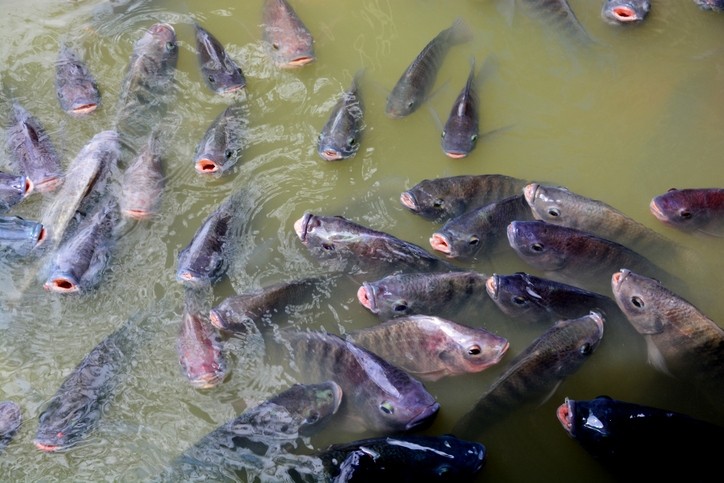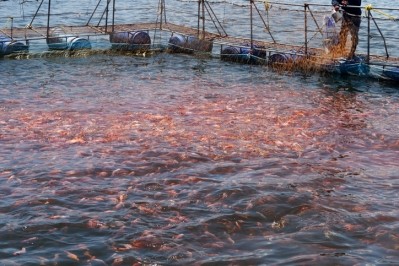Minty feed may boost tilapia survival during disease challenge

Researchers with the Federal University of Santa Catarina and the State University of Londrina in Brazil along with researchers from EMBRAPA explored the use of Mentha Piperita essential oil in tilapia (Oreochromis niloticus) diets when fish faced a disease challenge. The team published details of its product in the journal, Aquaculture.
“The aim of this study was to evaluate the influence of dietary supplementation with M. piperita essential oil on the hemato-immunological and zootechnical parameters of Nile tilapia after challenge with S. agalactiae,” the researchers said.
The scientists found that in the seven days following the disease challenge, fish receiving the supplemented diets maintained normal eating behavior for a longer period. However, fish growth and zootechnical performance were similar following the feeding trial.
“Supplementation with essential oil Mentha 0.25% when compared to concentrations of Mentha 0.075%, Mentha 0.125% and controls, promoted greater survival after experimental challenge,” they said. “The essential oil of M. piperita increased the resistance against S. agalactiae, pathogen responsible for large losses in tilapicultura.”
Addressing disease in tilapia
One of the main reasons for tilapia loss during aquaculture production comes from infection from Streptococcus spp., the researchers said. Outbreaks of the pathogen in farmed fish have been reported since at least the 1970s.
“This bacterium is known as [a] causative agent of human and cattle infection recently classified as a fish pathogen with zoonotic potential,” they added.
Natural products are emphasized for use in aquaculture as an alternative to the use of antibiotics or vaccines, they said. Phytotherapeutics, including essential oils, have been explored as a way to control bacteriosis because they are “safe and ecological” and can support fish immune response.
Some types of phytotherapeutics like essential oils present synergistic elements and may inhibit the appearance of a disease, they said.
“Campagnolo et al. (2013) emphasized that these substances influence the intestinal microbiota and improve digestibility and nutrient absorption and consequently the immune response,” the researchers added.
Why feed mentha piperita?
Peppermint, or mentha piperita, is often included in medicine and food, the researchers said. It is considered to have a beneficial effect on immunomodulatory actions, gastrointestinal tissue and chemopreventative potential.
Previous work with the essential oil has explored the antimicrobial properties of the plant and its compounds against resistant pathogens, they said. “Studies have found [it] to be more efficacious against Gram-positive bacteria, which are frequently more susceptible to inhibition than Gram-negative ones due to the presence of external hydrophilic membrane that blocks the entrance of hydrophobic essential oils into the cell membrane,” they added.
Essential oils may stimulate “peripheral vasodilation” and prevent the spread of bacteria, the researchers said. This is especially true for menthol which acts against “both Gram-positive and Gram-negative bacteria.”
Feeding and disease challenge trials
Prior to the feeding trial, the essential oil was extracted from gathered leaves of M. piperita using a hydro-distillation method, the researchers said. The minimum inhibitory concentration also was determined.
During the feeding and disease challenge trials, 300 Nile tilapia were given one of five diets for a period of 50 days, they said. The diets included a control diet, that diet with an alcohol additive and three trial feeds with peppermint essential oil added at 0.075%, 0.125% and 0.25%.
The control diet used was commercially available, they added. The cereal alcohol additive was trialed as it also was used to dilute the essential oil.
Fish were weighed, and biometry noted every 15 days, the researchers said. Following the 50-day feeding period, a selection of fish from each diet was harvested for hemato-immunological analysis.
Following the feeding period, remaining fish were stressed and challenged with Streptococcus agalactiae, they said. Tilapia were monitored for seven days to track mortality rate and clinical signs of the disease.
All fish were collected at the end of the observation period and brain and kidney samples were collected for analysis, they said.
Results
During the feeding trial all fish displayed similar feed intake, consumption and voracity, the researchers said.
At the end of the trial, there were no significant differences in weight, weight gain, final length, specific growth rate or efficiency between fish on any of the diets, they said. However, fish on the diet with 0.25% mentha tended to have a higher final weight and to be slightly longer.
Fish receiving the mentha 0.25% supplemented diet had the highest values of total leukocytes and total thrombocytes and had higher plasma protein levels compared to fish on the alcohol-supplemented control diet, they said.
Following the disease challenge, fish on all diets demonstrated clinical signs of the disease, the researchers said. However, fish on the supplemented diets continued eating at normal levels longer than those on supplemented diets.
Fish receiving the highest supplemented diet had a mortality rate of 26.11% compared to the control group’s 91%, they said. Fish mortality rates decreased linearly as more peppermint essential oil was added to the diet.
“The survival was high in fish with supplemented diet,” they said. “O. niloticus fed Mentha 0.25% showed significantly higher survival after challenge than fish fed with other diets.”
Source: Aquaculture
DOI: published online before print: 10.1016/j.aquaculture.2019.03.035
Title: Hemato-immunological and zootechnical parameters of Nile tilapia fed essential oil of Mentha piperita after challenge with Streptococcus agalactiae
Authors: L. Silva, U. Pereira, H. de Oliveira, E. Brasil, S. Pereira, E. Chagas, G. Jesus, L. Cardoso, J. Mouriño, M. Martins















